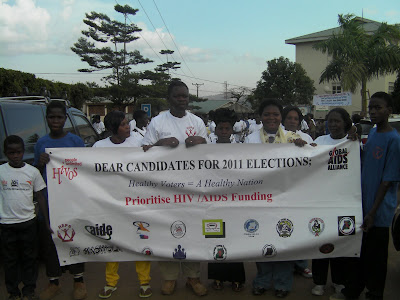Open letter to Uganda government on intentional ommission of LGBTI from accessing health care under HSSIP Policy

PICTURE CAPTION LGBTI and Sex workers rights activists join a match through the streets of Kampala (June2010) to demand increades funding and equal access to health care from leaders to be elected in next years's Presidential elections. The Ministry of Health has since intentionally omitted LGBTIs from HSSIPIII
November 7, 2010
The Permanent Secretary,
Ministry of Health,
P.O. Box 7272
Kampala- Uganda
Dear Sir,
RE: OMISSION OF SEXUAL MINORITIES FROM ACCESSING VITAL HEALTH SERVICES UNDER MARPS IN HEALTH SECTOR STRATEGIC PLAN III
Uganda Health and Science Press Association (UHSPA-Uganda), a network of groups and individuals working to mainstream minority rights in Uganda’s Public Health Policies and laws is concerned about the omission/ exclusion of sexual minorities from accessing vital health services in the soon to be launched Health Sector Strategic Plan III.
Although UHSPA participated in the Civil Society Joint Assessment of the HSSPIII, we have founded fears that the policy has not catered for health needs of sexual minorities under MARPS. The omission of this vulnerable group poses a threat to Uganda’s management of HIV/AIDS as the HSSPIII was our best hope as a country, for starting awareness, senstisation and information to sexual minorities, particularly LGBTI especially on HIV/AIDS.
While it is true that there are observed consistence of HIV infection rates among the married heterosexuals, the 2010 UNGASS Report for Uganda clearly shows that there is no policy intervention in our public health infrastructure to address vital access to health for sexual minorities. A PDF link to UNGASS 2010 is here: http://data.unaids.org/pub/Report/2010/uganda_2010_country_progress_report_en.pdf
Uganda as a current member of the United Nations Human Rights Council cannot afford to jubilate the vulnerability of some sections of its population by keeping them off the health access radar as clearly indicated in the UNGASS Report 2010.
Under state obligations to developing national health policies, Uganda agreed and committed to state parties responsibility in accordance with article 12.1 of the ICESCR (International Covenant on Economic, Social and Cultural Rights) to observe “the right of every one to the enjoyment of the highest attainable standard of physical and mental health.” Under the same state obligations, Uganda also agreed under Article 12.2 to “steps to be taken by state parties…… to achieve the full realization of this right,” under which the HSSPIII is conceived.
The right to health which HSSPIII intends to omit for sexual minorities is closely related to and dependent upon the realisation of other human rights as contained in the International Bill of Rights. By virtue of article 2.2 and article 3 of the ICESCR, the covenant proscribes any discrimination in access to health care and underlying determinants of health, as well as to means and entitlements for their procurement.
Besides, the Ministry of Health’s own National Policy Guidelines and Service Standards for Sexual and Reproductive Health and Rights recognizes sexual orientation and defines Sexuality as a “ central aspect of being human throughout life and encompasses sex, gender identities and roles, sexual orientation, eroticism, pleasure, intimacy and reproduction. It is experienced through thoughts, fantasies and perception.”
This communication is to express our concerns and fears on the omission of this vulnerable group from HSSPIII, and also request for a meeting to find a common way forward.
Yours truly,
Kikonyogo N. Kivumbi
Executive Director
Cc: Uganda Aids Commission
Civil Society
Partners
Support this campaign with a donation.UHSPA is now on paypal send us email for donation details


Comments